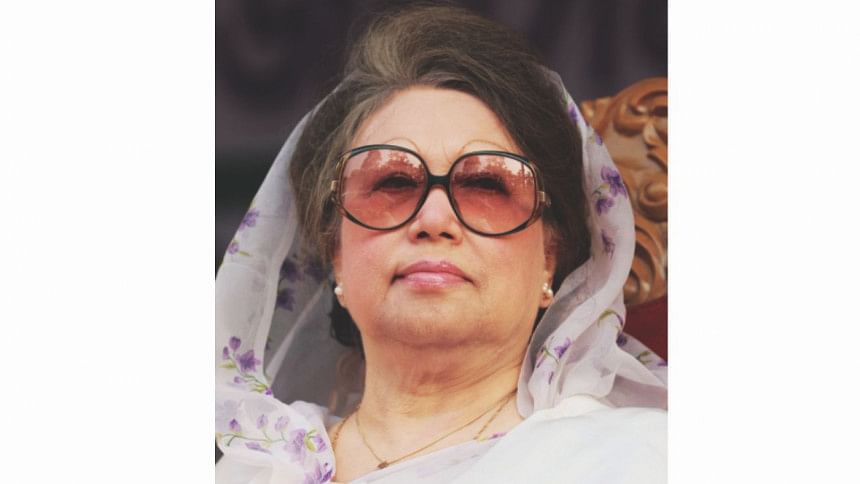Zia Orphanage Trust Case: Defence forged document

The defence had forged a document and submitted it to the court to save Khaleda Zia and other accused in the Zia Orphanage Trust graft case, reads the full verdict.
The document was said to be the photocopy of a letter from the Kuwait embassy in Dhaka sent on August 11, 2015 stating that the Kuwait amir gave donations to Zia Orphanage Trust, not for any individual or any other purpose.
But the Special Judge's Court-5 of Dhaka, which found Khaleda and five other accused guilty in the graft case earlier this month, had refused to consider the document as evidence, terming it forged and made-up.
Contacted around 7:30pm yesterday, AJ Mohammad Ali, Khaleda's counsel to whom the so-called letter was addressed, declined to make any comment, saying he didn't have the copy of the judgment at the time.
However, Masud Ahmed Talukder, another defence counsel, claimed the document was real.
He said the investigation officer of the case mentioned that the money came from Saudi Arabia but actually it was from Kuwait. So the defence side sent a letter to the Kuwait embassy in Dhaka seeking clarification and then the embassy issued the letter.
“It [letter] is a real document. If the judge termed the document forged, he [judge] made an irresponsible comment in the judgment,” he said.
The Daily Star couldn't get comments from the Kuwait embassy in Dhaka. Contacted around 7:30pm, someone from the reception desk of the embassy asked this correspondent to call today.
On February 8, Judge Md Akhtaruzzaman of a special Dhaka court sentenced the BNP chief to five years' rigorous imprisonment in the graft case.
Yesterday, her counsels filed an appeal with the High Court challenging the lower court verdict and praying for her acquittal.
After receiving the appeal, the HC bench of Justice M Enayetur Rahim and Justice Shahidul Karim yesterday fixed tomorrow (Thursday) for the hearing on whether it will accept the appeal.
The special court in its February 8 judgment also sentenced Khaleda's eldest son and BNP Senior Vice Chairman Tarique Rahman and four others to 10 years' rigorous imprisonment, and fined Tk 2.10 crore each.
The other convicts are Kazi Salimul Haque, ex-BNP lawmaker from Magura; Sharfuddin Ahmed, a businessman; Mominur Rahman, a cousin of Tarique; and Kamal Uddin Siddique, former principal secretary to the PM.
The Anti-Corruption Commission filed the case with Ramna Police Station in July 2008, accusing the six of misappropriating over Tk 2.1 crore that had come from a foreign bank as grants for orphans.
The defence claimed the Kuwaiti amir gave $12,55,000 or Tk 4,44,81,2160 to establish Zia Orphanage Trust. They also said they had “solid evidence” for this and it was that Kuwait embassy document, reads the full verdict.
Khaleda's counsels submitted the document to the court on November 3, 2016 and the court kept it in its record despite opposition from the public prosecutor, according to the verdict.
The defence submitted the document attaching a notarial certificate to it for judicial notice.
The said letter was addressed to “Mr Mohammad Ali, former attorney general, Bangladesh Nationalist Party (BNP), Dhaka.” He was the attorney general of Bangladesh during the BNP tenure from 2001 to 2006.
The document, as mentioned in the verdict, read: “This is to convey to you the clarification issued by the government of the State of Kuwait on the donation to Zia Orphanage Trust by his highness the amir of the State of Kuwait.
“As per the clarification, the donation was given to Zia Orphanage Trust and not for any individual or any other purpose.
“The embassy would further like to request all concerned not to use this clarification for any political purpose.”
The court asked why a photocopy of the certificate of Kuwait embassy was submitted, where is the original copy and how a photocopy could be taken to judicial notice.
Besides, the defence did not take any step to authenticate the photocopy by producing any official of the embassy as a defence witness, the court said.
But Khaleda's counsel Masud claimed they submitted the original letter, not the photocopy, maintaining due procedures. And, he added, they didn't produce any embassy official as witness because it is not permitted by law.
The Daily Star could not verify his claims.
In the judgment, the court further said the “letter” did not mention the name or designation of its sender or any memo number or the amount of money.
Defence counsels told the court that the then foreign minister ASM Mostafizur Rahman received $12,55,000 as donation from Kuwait government and later Kamal Uddin Siddique gave the money to Zia Memorial Orphanage Trust and Zia Orphanage Trust.
But the “letter” did not mention that the money was brought by Mostafizur Rahman and it was meant for building an orphanage after the name of former president Ziaur Rahman, the court said.
“The letter only used the name of the Zia Orphanage Trust and it infers that the letter of Kuwait embassy dated August 11, 2015 was fabricated to save Khaleda Zia and other accused,” the court said.
The court said the money ($12,55,000) came to the Prime Minister's Orphanage Fund from United Saudi Commercial Bank in 1991 and Zia Orphanage Trust was created two years later, on September 5, 1993.
“So the question arises whether the Kuwait amir gave the donation to Zia Orphanage Trust in 1991, even before the creation of the trust,” the judgment reads.
The court said the embassy was supposed to send the letter to the foreign secretary but it sent the letter to Mohammad Ali, a defence counsel for Khaleda, “which is not realistic.”
The money came in 1991 but the letter was issued in 2015 and it was notarised in 2016.
“So, the court don't find any reason to consider the notarial certificate and the Kuwait embassy letter dated August 11, 2015 for disposal of the case,” the verdict read.
“The court thinks the certificate of Kuwait embassy was forged and made-up by the defence,” reads the judgment.

 For all latest news, follow The Daily Star's Google News channel.
For all latest news, follow The Daily Star's Google News channel. 







Comments